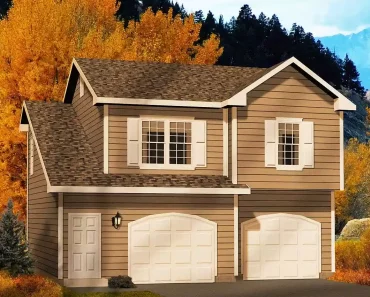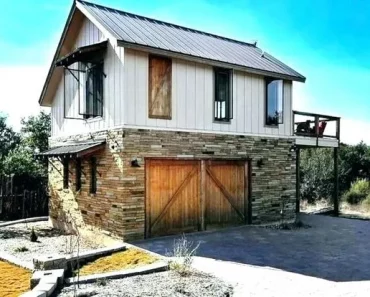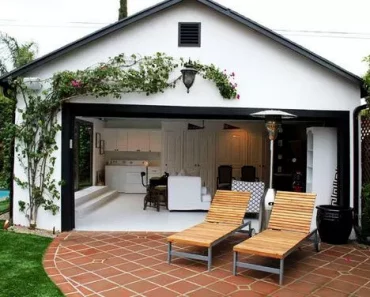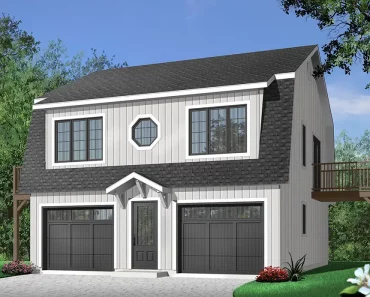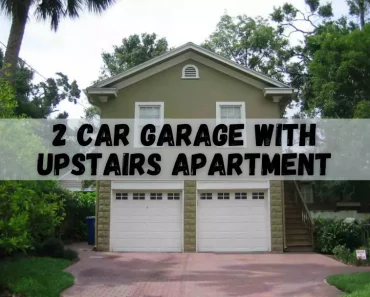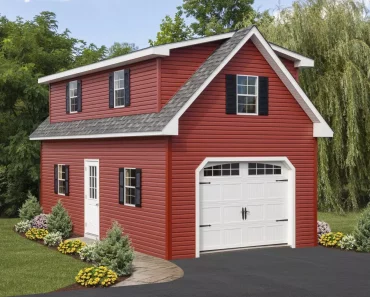Best Design Attached Garage with Apartment Above, The garage with apartment was once a delicate color (Think of Fonzie’s home made of leather above Cunningham’s garage on “Happy Days” From Some Movie).
Now Architects and designers are dreaming up the cost of building and renovating Attached Garage with Apartment Above as a living rooms on a warehouse. For the main house with many custom projects. It has become a panacea for modern housing problems. For members of the so-called Sandwich Generation Garage apartments are a place to stay with their elderly parents and boomerang adults when their rents continue to rise.
See also: Designing House Plans with Apartment Over Garage

Types Of Garage Apartment
- One-story garage conversions
If you’re really just talking about the space inside a one-car one-story garage, the conversion is going to be the size of the garage: a one-room bedroom or a studio. It may not have direct access to a bathroom without going through the main house. These types of garage conversions are typically used to house immediate family members of the main occupants, because the occupant will have to go into the main house for everything.
Some people do look to rent this type of garage conversion because it’s cost-effective and they either don’t need regular access to the rest of the house or feel they can make do with what the garage apartment offers as is. Rent-wise, it’s sort of one step removed from renting a room, offering just a bit more privacy and its own entrance for about the same cost.
- Two-story garage conversions
A freestanding garage, or a garage with a storage unit on the second floor above the garage, can be converted to a two-story garage unit that’s like a full apartment or “tiny house” adjacent to the main house. To be a true garage apartment, this would have to be self-contained, meaning with water and plumbing and some sort of kitchenette at minimum.
This type of unit can rent at the cost of a self-contained apartment rather than a room, and thus many people first consider doing the conversion to create an income property, not just for more space.
However, the increasing popularity of multi generational housing means that even as short-term rentals are losing viability, more homeowners are looking into garage apartments with a different intention. Instead of a revenue stream, they’re looking to create a semi-private dwelling for adult family members.
Difference Between Detached and Attached Garage
- Attached Garages
Attached garages, as the name implies, are garages that are part of a residence. In these garages, typically a door leads to the inside of the home, creating an extension in which to park a car and store numerous family and household items. The most common option for houses, attached garages are often fairly standard in shape and size.
Attached garages have many benefits to homeowners, including:
- Convenient to use, especially in bad weather
- Less expensive to build
- Able to use electrical and heating systems that are part of the home
- Satisfies homeowner association requirements
- Can raise property values

With an attached garage, it’s much easier to get pets, kids, and groceries inside, providing seamless access to interior living space. But attached garages have some cons that dissuade homeowners:
- Hard to fit onto a narrow lot
- Can be a security risk
- Greater fire risk
- Difficult to expand
- May compromise the exterior appearance of a home
- May require more-expensive building permits when constructed
Security is often the greatest downside to an attached garage. Easy to break into, especially when an electronic opener is used, an improperly-protected garage can provide a criminal with direct, unwanted access to your home.
- Detached Garages.
Detached garages, on the other hand, are not attached to a residence. Garages may be close by, but can also be on the other side of the property. Detached garages are often larger or more creatively built due to the freedom of a stand-alone format.
The pros of a detached garage include:
- Flexibility in size and location, with freedom to maximize lot area
- More room for cars and workspace
- Easier to expand or add on to if necessary
- More secure
- Improved curb appeal
- May increase resale value
In general, detached garages come with far more space than their attached counterparts. For those with hobbies like construction, car repair or welding, for example, a detached garage can provide room away from the main house. Additionally, detached garages can be nestled into the corners or sides of properties in order to avoid detracting from home size. But detached garages aren’t perfect, with downsides like:
- Less-convenient access to the home, especially in bad weather
- Required separate source for utilities
- May take up excessive yard space
- May be disallowed by a homeowners association
The lack of convenience is the biggest negative of a detached garage. For those with young children or who carry large loads into the home regularly, wrangling everyone and everything inside from a garage across the property can be a challenge. Additionally, extra utility hookups can be expensive, and can raise electricity rates incrementally each month.
Conclusion
The choice of attached garage or detached garage generally will hinge on a homeowner’s preference for convenience or flexibility. An attached garage is fast and easy, allowing simple access to your home with no hassles.
Alternately, a detached garage can be larger and easier to use with no limitations on space near a home. Ideal for garages with room for two or more cars or a workshop, a detached garage offers lots of potential for those looking to spread out.
There’s no right or wrong answer to the question of detached versus attached garages. So it’s up to you to decide what works best. From space and size to simplicity and convenience, there are plenty of pros for you to consider. Thank you for reading about the garage about “Attached Garage with Apartment Above ” hopefully it will be useful for you.

